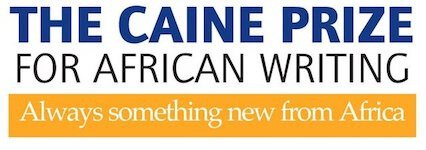Captured at Abantu Book Festival browsing book titles, Malebo Sephodi. Photo credit: Lidudumalingani
Soweto Hotel, where I was staying during the Abantu Book Festival, stands on concrete pillars, elevating it from its surroundings. The design is meant to create a sense of integration, with the locals selling food and fresh produce underneath the hotel, but the design also tests the limits of architecture as a tool to integrate those who have the privilege to make use of the hotel and those who cannot afford to. In the morning, one can hear the trains that travel not far from the hotel. In the afternoon, when the sun sets, the pillars underneath the hotel multiply and stretch further away from it. The balconies are large, extending further from one’s hotel room. I arrive at the hotel a day before the festival and upon arrival the founder Thando Mgqolozana, curator Panashe Chigumadzi and the rest of the team are welcoming guests at the foyer.
The list of authors at Abantu Book Festival was eclectic, a mixture of seasoned writers that have nurtured my reading and writing to the young writers who have been handed the baton to carry it forth. The festival asserted the truth that the South African literature scene is not a space in which only a handful of black authors write. During the festival the venues were always full, proving wrong the long held assumption that black people do not read. In the open space between the two main venues at the Eyethu Cultural Center attendees dipped into literary conversation and dance.
Attendee posing with 'May I Have This Dance' by Connie Manse Ngcaba and 'Half of a Yellow Sun' by Chimamanda Ngozi Adichie. Photo credit: Lidudumalingani
The events were split between Eyethu Cultural Center and the Soweto Theatre. Opposite the Eyethu Cultural Center, further down the road, is an old cinema, no longer operational, and on its left sits a church. I was in Soweto for five days and the architecture of oval shaped roofs, the theatre and the church became so familiar that I do not remember a life without them.
Hosting the Abantu Book Festival in Soweto was a not a mistake, it was deliberate. This is true for the venues too, Thando explained to me.
“I arrived at the Eyethu Cultural Center and knew immediately that this where we needed to host the events. It is right in the middle of the community. People can, if they so please, wander off the street and come in to find out what is happening.”
The shared feeling amongst the attendees was that here, for the first time perhaps at a book festival, black people are present, having conversations about literature and being unapologetically black. That here they can dance, laugh without worrying about being out of place. That their presence was not an irritation. One could sit outside and marvel at all of this, the absolute blackness of it, the freedom of people to be themselves.
At the Soweto Theatre, in the evenings, was where the dance moves were choreographed and revolutions, led by enchanting performances by Zuko Collective, were initiated. The festival in a pleasing way was part dancing and part intellectual, the way one is meant to feed a soul.
Essayist, Bongani Madondo, captured by Lidudumalingani at Abantu Book Festival
Going forward, one cannot deny that the festival can carve a place in the hearts of many, especially the black writers and readers, young and old, who feel that they have long been not catered for in the South African landscape.
Its challenge, something that was beginning to rear its head in one or two events, would be to carefully and precisely define for itself and for its attendees the nuanced difference between conversations about politics using the prism of literature and political conversations that can happen outside of literature. It needs to ensure that the conversations the audience and the panellists are having are rooted in the literature, that they come from it, that the literature is not completely abandoned, or else we will be a nation that has one conversation and annuls all others as fruitless, which would be dangerous and short sighted.
About the Author:
South Africa's Lidudumalingani is a writer, filmmaker and photographer. He was born in the Eastern Cape province of South Africa, in a village called Zikhovane. Lidudumalingani has published short stories, non-fiction and criticism in various publications. His films have been screened at a number of film festivals. Lidudmalingani won the Caine Prize in 2016 for 'Memories We Lost' and is currently a 2016 Morland Writing Scholar.
You can discover more of Lidudumalingani's stunning photos of the Abantu Book Festival on Brittle Paper's site here.



